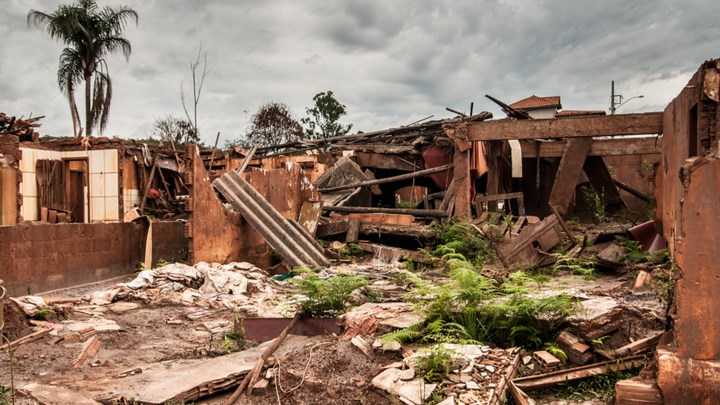Claimants to appeal fatal Samarco disaster ruling in UK court
THE Court of Appeals, the most senior court in England and Wales, has ruled to allow proceedings against BHP related to the fatal 2015 Samarco dam disaster to be reopened in the UK and allow appeal of the decision to strike out claims in the £5bn (US$6.9bn) case.
BHP, co-owner of mining company Samarco, argues that these claims do not belong in the UK, and that the issues involved have already been addressed in Brazil. Claimants argue that redress achieved in Brazil has been inadequate, with BHP largely protected from the legal consequences to date. They believe they have the right to pursue the company in the UK, where it is domiciled.

In 2015, the Fundão tailings dam in Mariana, Minas Gerais, Brazil collapsed, releasing a torrent of toxic sludge that buried homes and villages, killing 19 people, contaminating local waterways, and causing a significant environmental crisis. An independent investigation discovered that design flaws led to the collapse. About a year after the collapse, 21 people were charged with qualified homicide.
Viewing BHP as ultimately responsible for the disaster, the case against the company seeks an estimated £5bn in compensation for about 200,000 individuals, 25 Brazilian municipal governments, 530 businesses, a Catholic archdiocese, and members of an indigenous community. The case has been brought by international law firm Pogust, Goodhead, Mousinho, Bianchini & Martins (PGMBM).
Though the disaster occurred in Brazil, claimants expect that through appeal, jurisdiction can be established in England against BHP Group PLC and BHP Group Limited, domiciled in England and Australia respectively. In November 2020, the case was struck off when the High Court refused jurisdiction, and the decision was affirmed in May 2021 by an initial appeal ruling.
In a judgement published on 27 July, a panel of judges wrote that previous dismissal of permission to appeal had “mistakenly prevented numerous claimants, who had made no claims in Brazil, from suing in England”. Proceedings have been reopened under exceptional appeals legislation to avoid “real injustice”.
The ruling followed an oral hearing on 22 June. Dates for the case to be heard by the Court of Appeals have yet to be set.
Frederico de Assis Faria, Attorney General of Mariana, welcomed the panel’s decision.
He said: “Nearly six years on, we still live with the effects of what happened.”
“This case represents the rights of every affected individual. BHP's empty redress efforts in the national territory have been very disappointing and the reopening of the action in the English court gives us an opportunity for real justice.”
Tom Goodhead, Managing Partner at PGMBM who is involved in the case, commented: “This is a monumental judgement and our clients feel like this is the first time that any judges have recognised the importance of this case.”
Responding to the judgement, BHP said: “BHP’s position remains that the proceedings do not belong in the UK. Issues brought by the claimants are already covered by the work of the Renova Foundation, by existing decisions of the Brazilian Courts or are the subject of ongoing legal proceedings in Brazil.
“BHP will not be distracted from our commitment to do the right thing for the victims of the Fundão dam failure. We will continue to support the extensive ongoing remediation and compensation efforts of the Renova Foundation in Brazil.”
Launched in the wake of the 2015 collapse, the Renova Foundation is an autonomous, non-profit organisation responsible for remedying the impacts of the fatal incident.
According to BHP, Renova has spent more than R$13bn (US$2.49bn) across the 42 environmental and socioeconomic reparation and rehabilitation projects that it manages. The organisation has also provided compensation and financial aid to more than 325,000 people – totalling R$4bn.
Dismissing the adequacy of Renova, PGMBM point to a 2020 report by then-UN Special Rapporteur Baskut Tuncak. In the report, Tunak wrote: “In the aftermath of the [Samarco] disaster, [co-owners] BHP and Vale rushed to create the Renova Foundation to provide the affected communities an effective remedy.
“Unfortunately, the true purpose of the Renova Foundation appears to limit liability of BHP and Vale, rather than provide any semblance of an effective remedy. Institutional shortcomings are well-documented in literature and litigation. Today, none of 42 projects are on track.”
According to Latin American business intelligence company BNamericas, earlier this year, prosecutors in Minas Gerais petitioned to close the foundation, responding to problems in its governance.
Earlier this year, PGMBM along with German law firm Manner Spangenberg brought a “landmark” class action suit against technical services company TÜV SÜD concerning the fatal collapse of another Brazilian dam, responsible for at least 259 deaths. The dam was owned by Samarco co-owner Vale.
Recent Editions
Catch up on the latest news, views and jobs from The Chemical Engineer. Below are the four latest issues. View a wider selection of the archive from within the Magazine section of this site.




